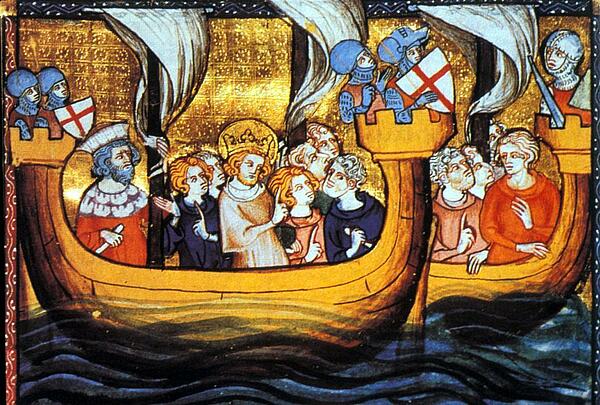The Seventh Crusade
Despite a lack of enthusiasm from his closest barons and noblemen, and being seriously ill with malaria, Louis IX of France decided to launch a Seventh Crusade in December 1244 to reclaim Jerusalem, which had once again fallen into Muslim hands.
The King was eager to free the Holy Land, which had been conquered by the Turks in August 1244, 15 years after the glory enjoyed by Frederick and his Sixth Crusade. He was also keen to rescue Damascus, which had been seized by the Sultan of Egypt's vast armies. Louis IX believed that the situation in Europe made it the perfect time to launch a new Crusade, as there was a break in the struggle between the Holy Roman Empire and the papacy. The kingdom of France was at peace thanks to the Holy Roman emperor and the barons eventually agreed to support their King in his bid to launch the Seventh Crusade.

The Seventh Crusade has similarities with the Sixth Crusade in that both were conceived and carried out under the control of a monarch, rather than the Church. This highlights the declining power of the papacy, who had by now lost control of the crusading movement. As papal power faded, rulers were increasingly able to use the crusades as a tool of national policy. This shift in focus, however, is thought to have contributed in the part to the failure of so many of the crusades, including the seventh.
After years of complicated preparations, Louis IX finally departed Aigues-Mortes on 25 August 1248, taking his family with him. They travelled alongside 100 ships and an army of 35,000 men, all aiming to seize Egypt’s key towns and use them as hostages to be offered in exchange for Syrian cities. The vast majority of the men were French, with a few Scots and Englishmen thrown in for good measure.
Following a council with his key men, the King had decided it would never be possible to capture Jerusalem while Egypt remained hostile, so, following a winter spent in Limassol, Cyprus, the Crusaders arrived close to Damietta, Egypt, in June of 1249. The King arrived in Egypt with only around a quarter of the men he had set out with, as a result of diminishing supplies which had been used up during their lengthy stay in Cyprus, and a storm which scattered many of the boats and troops.
Both Damietta's port and town were extremely heavily fortified in a bid to ward off any attacks, but Louis IX and his men were able to gain entry to the town on 6 June 1249. From there, they headed onto Cairo, but their efforts were hampered thanks to the Nile, which was flooded with excess rain water, making the river and its canals impassable for many months.
The army was heading for the citadel of al-Mansurah, which had been identified as a target in need of capture. Several failed attempts to construct a pontoon bridge followed, with the Crusaders finally succeeding and entering the citadel, at which point a battle ensued on 8 February 1250. During the struggle, Louis IX's brother, Robert of Artois, was killed, and Louis IX was finally declared the victor of the battle, the outcome of which had gone undecided for several months.
Post Victory
Despite this victory, the Crusaders were tired from the fighting and many contracted a plague, which diminished their numbers even further. Louis IX was forced to make the decision that the army would retreat back to Damietta. As the Crusaders were heading back to Damietta, the Egyptian armies approached the weakened men and captured the King and many of his key barons on 7 April 1250.
Following months of negotiations, the King and his barons were set free from prison, in exchange for a substantial ransom and Louis IX returned to join his wife at Acre. He made the decision to stay there with the remaining Crusaders and barons, rather than return to France which is what the majority of men were keen to do.
Over the next four years, the King was able to turn a military defeat on its head through negotiations and diplomacy. He made numerous advantageous alliances and also managed to fortify the Christian cities of Syria. The King eventually returned to his Kingdom upon learning of his mother’s death.
See also: The Eighth Crusade
MLA Citation/Reference
"The Seventh Crusade". HistoryLearning.com. 2025. Web.
